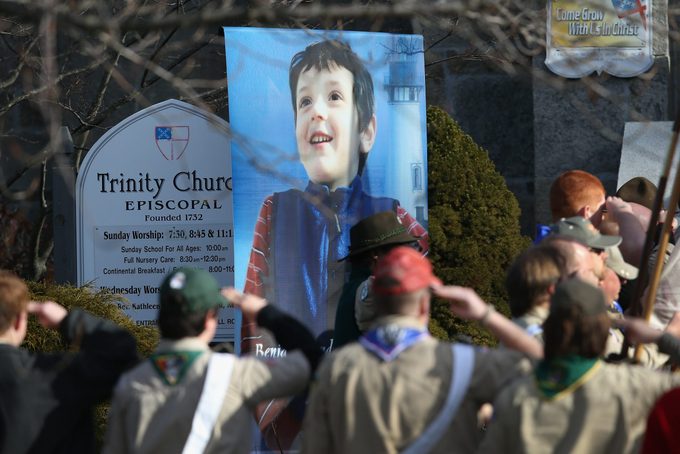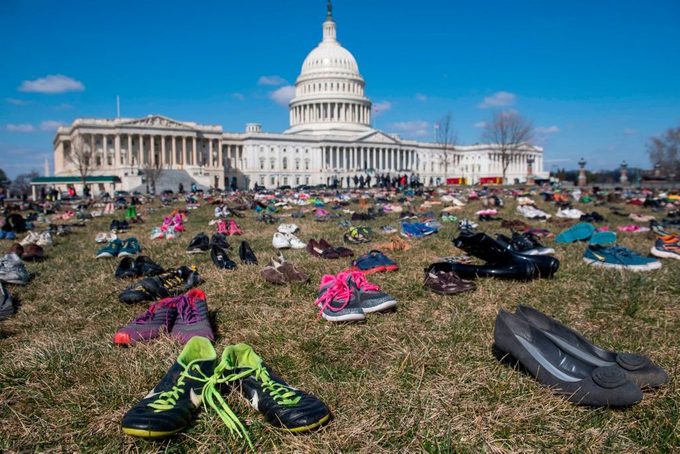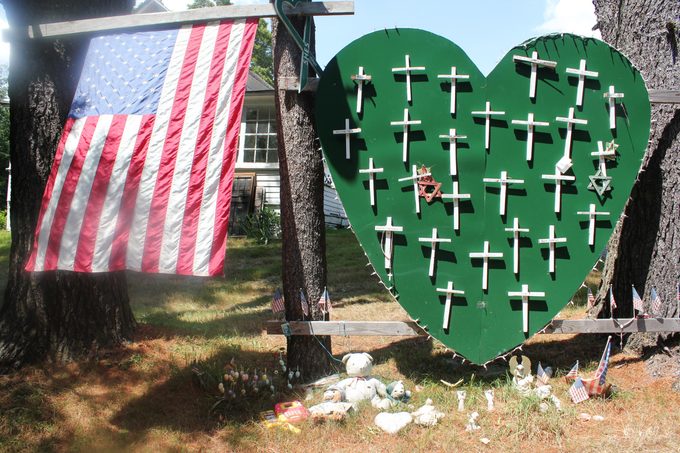How Sandy Hook Parents Proved That Gunmakers Can Be Held Accountable
Updated: Nov. 07, 2022

Could the settlement be a turning point in America's gun violence epidemic?
In the aftermath of a mass shooting or other act of gun violence, as Americans try to process how something so horrific could happen yet again, the role of gunmakers is often called into question. Many wonder whether they can (or should) be held legally responsible in some way for the loss of life that resulted from someone using their products. But in the United States, gun manufacturers have long been untouchable. Thanks to legislative protection—in the form of a “federal shield” of immunity—no matter what has been thrown at gunmakers legally, they have consistently emerged on top.
That is, until February 15, 2022, when the families of nine of the people killed in the mass shooting at Sandy Hook Elementary School in Newtown, Connecticut, won a $73 million settlement in a lawsuit against Remington, the maker of the AR-15-style rifle used in the 2012 massacre. While the families were granted the right to sue the gun manufacturer in 2019, they were far from the first group to take that route in an attempt to hold the companies accountable for the destruction their products caused.
But unlike other lawsuits against gunmakers, the one Sandy Hook families brought to the Connecticut Supreme Court was the first to demonstrate that the federal shield isn’t entirely impenetrable. In other words, it proved the courts may succeed where legislative attempts have failed.
“The settlement is a game changer,” says Jody Madeira, PhD, a professor at Indiana University’s Maurer School of Law and an expert on the Second Amendment and firearm violence. “It indicates that gun manufacturers can still feel some pressure from impending litigation, despite federal laws like the Protection of Lawful Commerce in Arms Act [PLCAA]—and state equivalents—that make it almost impossible to bring suit against manufacturers for their intentional, reckless, and negligent contributions to the gun violence epidemic.”

Indeed, America’s gun violence statistics are sobering, overwhelming, and completely heartbreaking. And while we’ve seen how other countries respond to mass shootings (with varying levels of success), many lawmakers in the United States are more concerned with protecting the Second Amendment than talking about how to help prevent school shootings, if it happens to involve any restrictions on gun ownership.
In the meantime, people are left with a lot of questions, including what it would take to amend the Constitution, how to help the victims and families of the Uvalde school shooting, and what effect the recent Sandy Hook settlement could have on gun violence in America. Here’s what to know.
How gunmakers in America enjoy federal protection
The question of why it’s so hard to stop gun violence in America is a complicated one because it involves numerous factors, including the elasticity of the U.S. Constitution, the country’s powerful gun lobby, and the fact that many people believe that their individual right to own and carry a firearm is more important than the public good. But one of the biggest obstacles to reducing gun violence in America is the federal immunity protecting gun manufacturers.
The PLCAA and its equivalents on the state level are, in large part, responsible for that. These laws make it nearly impossible to bring a successful lawsuit against a gun manufacturer or distributor after an act of gun violence. “In general, it protects firearms manufacturers and retailers from being sued for criminal acts of a third party,” Madeira explains.
Over the years, we’ve learned a lot about mass shootings, including the four things most school shooters have in common, and why Italy has a gun culture without mass shootings. Yet figuring out how to hold gunmakers accountable for the acts of violence carried out using their weapons has remained out of reach.
So, how did gun manufacturers achieve this type of protection? It helps to have friends in high places. Many lawmakers’ campaigns for office relied on funding from the deep pockets of gun rights groups like the National Rifle Association (NRA), which has spent more than $148 million on federal elections since 2010. So when mass shootings happen, legislators who were elected with financial assistance from the gun lobby typically offer little more than “thoughts and prayers.”
“From time to time, various industries are able to lobby for immunity in a way that cities, states, and the federal government have immunity,” attorney Wayne Cohen, a professorial lecturer at The George Washington University School of Law, tells Reader’s Digest. “Typically, as in the case of the firearms industry, the protected companies are extremely well funded and highly profitable.”
Not only have these laws provided broad immunity for gun companies so that most cases have been dismissed at the courthouse doors, but they have also “acted as a deterrent to litigation by victims and victims’ families,” says Jared Carter, an assistant professor at Vermont Law School with expertise in constitutional law. Simply put, with most attempts to bring a case against gunmakers failing, many people decide that it’s not worth the time, money, and effort trying to do so themselves.
Why this case succeeded where others failed
In short, the lawsuit the Sandy Hook families brought against Remington succeeded by taking advantage of one of the few scenarios in which the PLCAA’s far-reaching protection of gunmakers does not apply: when firearm manufacturers and dealers violate federal or state laws “applicable to the sale or marketing of the product.”
In this case, the Sandy Hook plaintiffs “claimed that Remington marketed the Bushmaster rifle in a militaristic way that emphasized the weapon’s utility in combat in ways that could appeal to troubled individuals,” Madeira explains, citing the rifle’s advertising slogan (“Consider your man card reissued”) as an example. “This settlement is so significant because it shows that the PLCAA does not bar suits against manufacturers claiming that wrongful advertising resulted in injury or death.”
The precedent this case may set for the future

Because the Sandy Hook settlement involved a specific set of circumstances—and was reached in a courtroom, not a legislative chamber—its effect on the future of gun-safety legislation remains unclear. Still, Carter says that the settlement sets a precedent “so far as it represents a crack in the gunmakers’ armor.”
More specifically, Miguel Custodio, a partner at and cofounder of the Los Angeles personal injury law firm Custodio and Dubey, says that the settlement has made it clear that gun manufacturers need to be extremely careful with how they market their products. “It also shows that, depending on the state where the lawsuit is filed, consumer protection laws may be a way to circumvent the seemingly ironclad shield against gunmakers,” he tells Reader’s Digest.
Read on for some of the ways the case could have an impact on the regulation of guns in the United States.
It could encourage similar lawsuits
While Madeira doesn’t think that the Sandy Hook settlement will make passing gun-safety legislation any easier, she says that its outcome could incentivize gun-related litigation in the United States. Translation: It could encourage more people to sue gun manufacturers.
“This is exactly what the Sandy Hook families intended—to help prevent future school shootings,” she explains. “This case paves the way for future litigation that involves [similar] PLCAA exception claims. It is likely that future courts will turn to the Connecticut Supreme Court’s determination that these claims survived PLCAA because the U.S. Supreme Court chose not to become involved.”
But while more people may consider legal action, Madeira says that there are details of the Sandy Hook settlement that have left her unconvinced that the case will prompt a flood of new lawsuits against gunmakers. “Remington was in bankruptcy and was very vulnerable,” she explains. “Other manufacturers might not be in the same position.”
It could guide future lawsuits
Moving forward, those who decide to file suit against gunmakers will likely look to the Sandy Hook settlement, Carter says, using it as both leverage and a strategy to obtain similar results. “It shows that even under the current legal framework, gun manufacturers can be liable for their actions,” he adds.
Likewise, Cohen sees the settlement as a guide for future lawsuits. “The payment of over $73 million underscores the risk that Remington faced if it had gone to trial,” he explains. “The entire firearms industry at large has exposure in a way it had not before, and the families’ argument that the marketing of the weapon violated Connecticut consumer law provides a roadmap to sidestep the PLCAA.”
But according to Jeff Caesar Chukwuma, founder of and senior partner at Chukwuma Law Group, although many states have similar consumer protection laws like the one used to hold Remington accountable in the Sandy Hook case, it’s unlikely that all state courts will interpret the scope of those laws in the same way.
“Nonetheless, a few more key wins for plaintiffs might be enough to force gun manufacturers to change course without needing additional legislation,” he says. “Whether such a shift will actually happen and be sufficient to reduce the incidence of gun violence in the country remains to be seen.”
It demonstrates that there’s a way around political gridlock
The country’s deep political divide has made it difficult to pass any type of legislation, let alone laws governing something as controversial as gun control.
“As we’ve seen recently in this country, the legislative process, especially at the federal level, is notoriously slow to respond to calls for change on several important issues,” says Chukwuma. “Allowing the families of victims of gun violence to seek a redress of their grievances through the courts rather than Congress could be the most expedient way to bring about change in this country’s relationship with guns by taking square aim at the gun manufacturers.”
Having said that, it has been nearly a decade since the Sandy Hook shooting. Going through the courts to make legal advancements may be faster than making progress in Congress, but it’s by no means speedy. As Madeira points out, it’s “a very slow path to influence.”
How holding gunmakers accountable could reduce gun violence

At this point, it’s difficult to imagine what American society could look like if gunmakers were held accountable when the use of their products resulted in the loss of human lives. Some people don’t believe that the Sandy Hook settlement will reduce gun violence, saying the country should focus on stopping the perpetrators of mass shootings instead of targeting gunmakers.
But experts see potential pathways to change that begin with the Sandy Hook settlement.
It could alter gun ads
“This settlement could incentivize gun manufacturers and retailers to put into place more responsible practices and policies that could lower their liability, which would go hand in hand with reducing gun violence,” Madeira says. “For example, manufacturers would be discouraged from utilizing advertising strategies that target insecure or at-risk men, or advertising in certain placements, such as in violent video games.”
On the other hand, she’s concerned that the outcome of the settlement could incentivize Congress or states to give additional protections to the firearm industry—which, she says, “would be the exact opposite reaction that was desired by Sandy Hook families.”
It could threaten gunmakers’ bottom lines
Ultimately, though, it’s unlikely that we’ll see gun manufacturers shift their position until it makes financial sense for them to do so, according to several of the experts we interviewed. When large companies like gun manufacturers suddenly face the risk of having to pay out large settlements, corporate behavior changes, Cohen explains. “Historically, we have seen this in the insurance, asbestos, and tobacco industries as well as a slew of others,” he notes. “In this way, the law can be used as a tool to effectuate social change.”
For Carter, holding gunmakers accountable—and, in turn, reducing gun violence and school shootings—comes down to basic economics. Like manufacturers of other types of dangerous goods, the gun industry’s biggest concern (along with maximizing profits) is avoiding liability when someone inevitably is harmed or killed as a result of their products. And thanks to federal and state shield laws, this has, for the most part, been possible.
But if lawsuits similar to the one brought by the Sandy Hook families become more common and suddenly force gunmakers to account for potential legal liability, Carter says that they will have to figure those expenses into their business models.
“This will mean innovating ways to improve gun safety, reduce gun violence, and likely increase the cost of guns, which will lead to fewer purchases of guns,” he explains. “This, in turn, will likely reduce gun violence in the same way that seat belts, airbags, and anti-lock brakes reduced the likelihood of injury in a car accident. It really is basic economics and turns on the free market belief that gun makers will make economically rational decisions given that they will be liable for those decisions and the resulting outcomes of gun violence.”
Additional reporting by Luis Muñoz de la Vega.
Sources:
- Jody L. Madeira, PhD, professor at Indiana University’s Maurer School of Law
- Wayne Cohen, professorial lecturer at The George Washington University School of Law and founder and managing partner of Cohen and Cohen
- Jared Carter, assistant professor at Vermont Law School
- Miguel Custodio, founder of and partner at Custodio and Dubey
- Jeff Caesar Chukwuma, founder of and senior partner at Chukwuma Law Group
- Congress: “S.397 – Protection of Lawful Commerce in Arms Act”
- The New York Times: “A Blueprint for Suing Gun Makers Emerges”
- The Boston Globe: “See how the NRA and other gun rights groups have spent money on political campaigns in recent years”


















